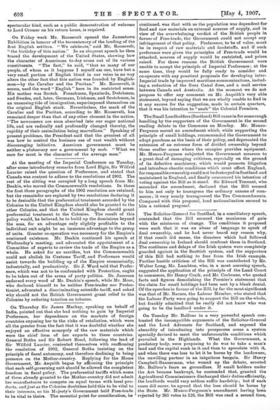On Thursday Sir James Mackay, speaking on behalf of India,
pointed out that she had nothing to gain by Imperial Preference, her dependence on the markets of foreign countries exposing her to the risks of retaliation, which were all the greater from the fact that it was doubtful whether she enjoyed an effective monopoly of the raw materials which were the chief item of her exports to these countries. General Botha and Sir Robert Bond, following the lead of Sir Wilfrid Laurier, contented themselves with reaffirming the resolution of 1902, General Botha insisting on the principle of fiscal autonomy, and therefore declining to bring pressure on the blether-country. Replying for the Home Government, Mr. Asquith began by affirming the principle that each self-governing unit should be allowed the completely freedom in fiscal policy. The preferential tariffs which some of them already granted to the Mother-country did not admit her manufactures to compete on equal terms with local pro- ducts, and just as the Colonies doubtless held this to be vital to their interests, so his Majesty's Government held Free-trade to be vital to theirs. The essential point for consideration, he continued, was that with us the population was dependent for food and raw materials on external sources of supply, and in view of the overwhelming verdict of the British people in favour of Free-trade, the' Government could not accept any infringement of that policy. Preference; to be of value, must be in respect of raw materials and foodstuffs, and if such preference were given the principles of Free-trade would be attacked, sources of supply would be restricted, and prices raised. For these reasons the British Government were unable to accept the principle of Imperial Preference ; at the same time, they would be fully ready to consider and co-operate with any practical proposals for developing inter- Imperial trade by improved maritime communications, includ- ing a reduction of the Suez Canal dues, and a mail service between Canada and Australia. At the moment we do not propose to offer any comment on Mr. Asquith's very able statement, beyond saying that we are wholly unable to find in it any excuse for the suggestion, made in certain quarters, that it was his intention to "snub" the Colonial Premiers.














































 Previous page
Previous page